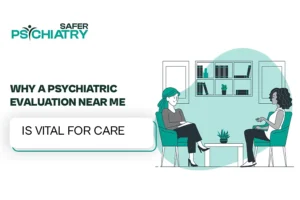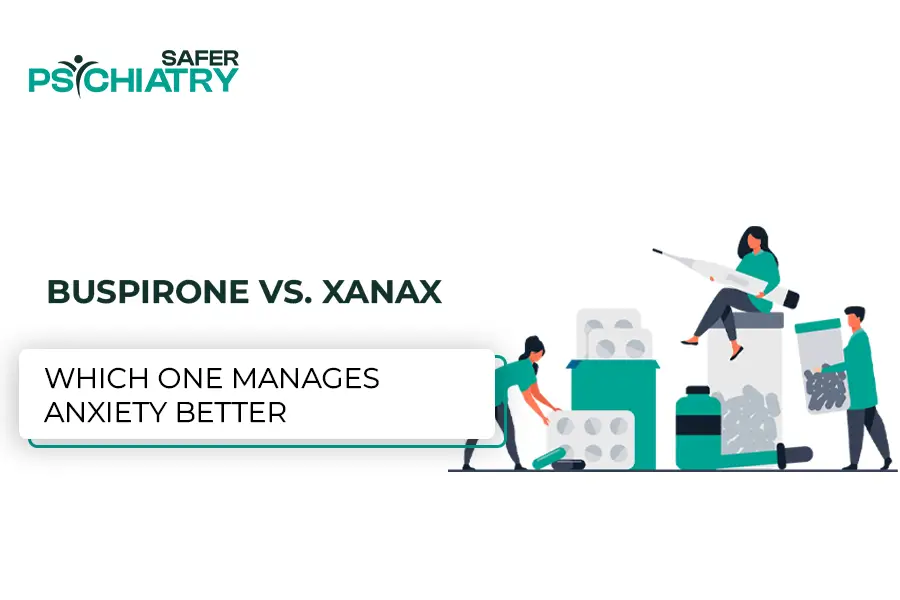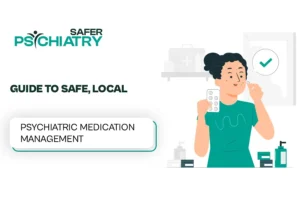
Medications for Bipolar Disorder
Finding the Right Balance for Mental Stability
At Safer Psychiatry, we provide compassionate, evidence – based mental health care to support your well-being now and for the future – because your journey matters, and so do you.

- Bipolar disorder requires lifelong management with medications, therapy, and lifestyle balance.
- Mood stabilizers are the first-line treatment for preventing episodes.
- Antipsychotics are added for mania control and maintenance.
- Antidepressants should be used cautiously to avoid manic switching.
- Personalized medication management ensures safety and stability for each patient.
Bipolar disorder is a complex mental health condition that causes extreme mood swings, ranging from manic highs to depressive lows. Manage this condition often requires long-term medication to balance mood, reduce symptoms, and prevent relapse.
Safer Psychiatry, approach to bipolar disorder treatment emphasizes safety, personalization, and evidence-based care, each patient receives the most effective and acceptable medication plan
What Are Medications for Bipolar Disorder?
Medications for bipolar disorder are prescribed to stabilize mood and reduce the frequency and intensity of manic and depressive episodes. The right treatment combination depends on the type of bipolar disorder (Type 1, Type 2, or Cyclothymic) and the individual’s response to therapy.
The main classes of medications include:
1. Mood Stabilizers
Mood stabilizers are the foundation of bipolar disorder treatment. They help reduce mood fluctuations and prevent future episodes.
Common Mood Stabilizers:
- Lithium, One of the oldest and most effective medications for mania prevention and mood stabilization.
- Valproic Acid (Depakote), Often used when lithium is not tolerated; effective for rapid-cycling bipolar disorder.
- Lamotrigine (Lamictal), Helps prevent depressive episodes, particularly in bipolar II disorder.
- Carbamazepine (Tigerton) and Oxcarbazepine (Tripletail) – Used for managing mixed or manic states.
2. Antipsychotic Medications
These medications help manage manic or mixed episodes and are sometimes used with mood stabilizers.
Common Antipsychotics for Bipolar Disorder:
- Quetiapine (Seroquel) – Effective for both mania and bipolar depression.
- Olanzapine (Zyprexa) – Used for acute mania and maintenance therapy.
- Risperidone (Risperdal) – Helpful in treating irritability and manic symptoms.
- Aripiprazole (Abilify) – Reduces mania with a lower risk of weight gain.
- Ziprasidone (Geodon) – Treats manic episodes and may aid mood stabilization.
3. Antidepressants
While antidepressants can help with depressive episodes, they must be used carefully — ideally alongside a mood stabilizer to prevent triggering mania.
Commonly Used Antidepressants:
- Bupropion (Wellbutrin) – A mild antidepressant less likely to cause mood elevation.
- Venlafaxine (Effexor) and Duloxetine (Cymbalta) – Useful for depression and anxiety symptoms.
- Mirtazapine (Remeron) – Can help with sleep and appetite issues.
4. Adjunctive or Supportive Medications
Other medications may be used to support overall treatment and symptom management:
- Topiramate (Topamax) – May help stabilize mood and assist in weight management.
- Gabapentin (Neurontin) and Pregabalin (Lyrica) – Sometimes used for anxiety and sleep issues associated with bipolar disorder.
Personalized Treatment at Safer Psychiatry
There is no one-size-fits-all approach to bipolar disorder treatment. At Safer Psychiatry, we tailor treatment based on:
- Individual symptoms and bipolar type
- Co-existing conditions (like anxiety or ADHD)
- Side effect tolerance
- Past medication responses
Our clinicians focus on patient safety, minimal side effects, and optimal quality of life, balancing clinical expertise with compassionate care.
Side Effects and Safety Considerations
Each medication comes with potential side effects such as:
- Weight gain (common with antipsychotics)
- Tremors or thirst (seen with lithium)
- Drowsiness or dizziness (anticonvulsants)
- Metabolic changes (blood sugar, cholesterol)
Regular blood tests, psychiatric evaluations, and lifestyle support are key to safe, long-term treatment success.
Final Thoughts
Bipolar disorder can be challenging, but with the right medication plan, patients can lead stable, fulfilling lives. Safer Psychiatry goal is to provide evidence-based, compassionate care that emphasizes safety, efficacy, and long-term well-being.
Find Relief, With Safer Psychiatry. Our board-certified psychiatrists specialize in personalized, evidence-based bipolar treatment with a focus on safety, compassion, and real results.
Schedule a consultation today to discover a balanced, effective medication plan designed just for you. Book an Appointment with Safer Psychiatry.
FAQ
Frequently Asked Questions
Our Company
Copyright © 2024 Safer Psychiatric Consulting Services


